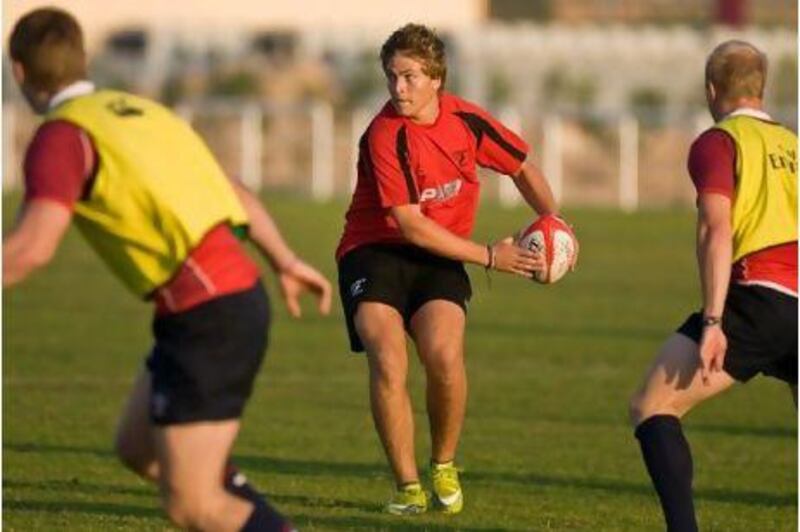When Haydn Palmer runs out for his Arabian Gulf debut in the IRB tournament tomorrow, he will complete the second half of a record that will never be broken.
The 18-year-old student will follow his father, Nigel, in wearing the colours of the region's representative side.
They are the first father-son pairing to play for the Gulf and, on the basis that the side is being disbanded to make way for new teams representing their constituent nations, they will also be the last.
"I'm not sure how I am going to feel," said Nigel, who played top division rugby as a back-row forward for Cross Keys in his native Wales before moving to the Gulf in 1995.
"I'll probably be very, very nervous because he is an 18-year-old boy running out against international players in front of 40,000 people. But I know he can do it. It is going to be a great day."
The junior Palmer will become the third generation of his family to play international sport. His late grandfather on his mother's side, Derek Tapscott, played football for Arsenal and Cardiff City and made 14 appearances for Wales in the late 1950s.
Haydn lived for the first three years of his life in Wales before the family relocated to Bahrain with his father's work in the security industry.
He picked up the sport while watching on from the sidelines as Nigel was captaining Bahrain rugby club and turning out in international competition for the Gulf.
"Because of his grandfather, Haydn also really enjoyed football, but he started playing touch rugby and we realised he was actually very good at it," said Nigel, who will have to take time out from coaching the Gulf Vets Legends to watch his son play this weekend.
"As the years have gone by and he grew a little bigger he started to feel rugby was more important to him, but I wouldn't push him in to anything."
Currently on gap year between school and university, Haydn is heading to the International Rugby Academy in New Zealand in January. "I want to see how far I can take rugby, but whatever happens I want to stay as close to sport as possible," he said.
Despite his rugby pedigree, the Dubai Hurricanes centre remains a relative newcomer to sevens.
All his rugby experience to date has been in the 15-a-side format, but he underwent a crash course last weekend when he played for the new UAE representative side against the likes of the Samoa Barbarians at the Sri Lanka Sevens.
"This is the first time I have played sevens," he said. "I played briefly when I was 16 at school and didn't really enjoy it that much, but I thought I'd give it a try here. It is hard work.
"I went to Sri Lanka with the UAE team [a new side also including emerging Emirati players] and the standard was very high."
Shane Thornton, the coach, is unconcerned about handing the teenager his chance in a youthful Gulf sevens line-up.
"Haydn has come through and done very well over the past six months and he played very well [when a Gulf Barbarians side played at the Gold Coast Sevens three weeks ago]," said Thornton.
"He will still be available for the UAE [when the Gulf side disbands], so it is good that we are able to bring players like him through."
Ironically, given that this is the last tournament they will play together, the Gulf side is packed full of talented young prospects.
Led by a trio of gifted students, Jonny MacDonald, James Love and Palmer, they are targeting one win from their three pool matches tomorrow. The task facing the part-time side is never an easy one, but it will rarely have been any tougher than it is this weekend.
The have been pitched into a pool containing the reigning world series champions Samoa, as well as a Kenya side who are highly-regarded in this format of rugby.
The lowest ranked of their rivals in the group, Wales, are also the current Sevens World Cup champions, a title they won in Dubai in 2008.
"Hopefully we can turn one of the big guns over, but there is never an easy game for the Gulf when we are playing at the top level," Thornton said.
"We have all the top guns in our group, but what can you do? You just have to play well and hope you can get one over on them."






